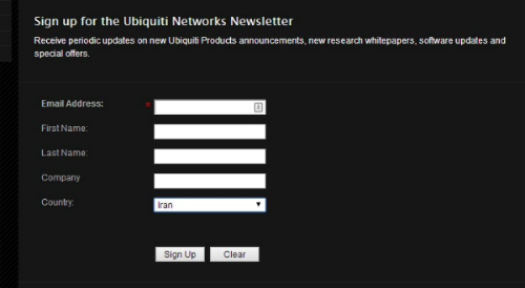![By Robert J. Pera (Coutesy of Robert J. Pera) [CC-BY-2.5 (http://creativecommons.org/licenses/by/2.5)], via Wikimedia Commons http://commons.wikimedia.org/wiki/File%3APera.jpeg By Robert J. Pera (Coutesy of Robert J. Pera) [CC-BY-2.5 (http://creativecommons.org/licenses/by/2.5)], via Wikimedia Commons http://commons.wikimedia.org/wiki/File%3APera.jpeg](https://www.exportlawblog.com/images/Robert_Pera.jpg)
ABOVE: Robert J. Pera
CEO, Ubiquiti Networks
The Office of Foreign Assets Control (“OFAC”) announced last week that Ubiquiti Networks agreed to pay $504,225 to settle charges that Ubiquiti violated the Iran sanctions when it granted a distributor in the U.A.E. exclusive rights to distribute its products in Iran and then sold goods to that distributor which were then shipped to Iran. This was only a minor reduction from the base penalty of $560,250. The reason for Ubiquiti paying so much can be found in some harsh language from OFAC:
Ubiquiti demonstrated reckless disregard for U.S. sanction requirements; Ubiquiti was on notice in February 2010 that the conduct at issue constituted a violation of U.S. law; members of Ubiquiti’s senior management knew or had reason to know that Ubiquiti products were reexported to Iran; [and] Ubiquiti had no OFAC compliance program in place at the time of the apparent violations
Ouch.
You would think that a half-million dollar fine would have caused the company to beef up its compliance game. But head over to the company’s website and sign up for its newsletter to learn more about its products. Take a look at the country drop-down list in the sign up form and you’ll see Iran.

Of course, under the informational exception, it is not illegal to send the newsletter to Iran.  But the newsletter describes products and services that, as Ubiquiti now rather expensively has found out, cannot be shipped to Iran. So why would anyone in Iran be interested in a newsletter about something they are not able to purchase? Here’s a good export compliance tip for our readers: take Iran out of your country drop-down lists for product brochures, newsletters and other promotional materials.
The founder and owner of Ubiquiti is Robert J. Pera. Â You might also know as the owner of the Memphis Grizzlies. Â You might also know hims as one of the people on Forbes’s list of the ten youngest billionaires in the world. Â Even in the unlikely event that he pays the entire OFAC fine out of his own pocket, he will still be a billionaire.

 Posted by
Posted by  Category:
Category: 

![Formal Fridays via http://www.glassdoor.com/Photos/Coursera-Mountain-View-Office-Photos-EI_IE654749.0,8_IL.9,22_IC1147431.htm [Fair Use] Formal Fridays via http://www.glassdoor.com/Photos/Coursera-Mountain-View-Office-Photos-EI_IE654749.0,8_IL.9,22_IC1147431.htm [Fair Use]](https://www.exportlawblog.com/images/Coursera.jpg) I missed this earlier, but back at the end of January,
I missed this earlier, but back at the end of January, ![Sources:http://stephenlaw.blogspot.com/ and http://magwayfootballclub.com/images/stories/group/u_tun_myint_naing.jpg [Fair Use] Sources:http://stephenlaw.blogspot.com/ and http://magwayfootballclub.com/images/stories/group/u_tun_myint_naing.jpg [Fair Use]](https://www.exportlawblog.com/images/law.jpg) Stephen Law is a distinguished scholar, a philosopher and a senior lecturer at Heythrop College, University of London. Steven Law, on the other hand, is a Burmese man, also known as Tun Myint Naing, who helps to run his father’s drug trafficking empire as
Stephen Law is a distinguished scholar, a philosopher and a senior lecturer at Heythrop College, University of London. Steven Law, on the other hand, is a Burmese man, also known as Tun Myint Naing, who helps to run his father’s drug trafficking empire as ![Ante Gotovina http://rudebutgood.blogspot.com/2012/11/ante-gotovina.html [Fair Use] Ante Gotovina http://rudebutgood.blogspot.com/2012/11/ante-gotovina.html [Fair Use]](https://www.exportlawblog.com/images/gotovina.jpg)
![By Jean-Pierre Bazard Jpbazard (Own work) [GFDL (http://www.gnu.org/copyleft/fdl.html) or CC-BY-SA-3.0-2.5-2.0-1.0 (http://creativecommons.org/licenses/by-sa/3.0)], via Wikimedia Commons http://commons.wikimedia.org/wiki/File%3ALe_navire_cargo_%E2%80%98%E2%80%99Iran_Sadr%E2%80%98%E2%80%99_(6).jpg By Jean-Pierre Bazard Jpbazard (Own work) [GFDL (http://www.gnu.org/copyleft/fdl.html) or CC-BY-SA-3.0-2.5-2.0-1.0 (http://creativecommons.org/licenses/by-sa/3.0)], via Wikimedia Commons http://commons.wikimedia.org/wiki/File%3ALe_navire_cargo_%E2%80%98%E2%80%99Iran_Sadr%E2%80%98%E2%80%99_(6).jpg](https://www.exportlawblog.com/images/iran boat.jpg)


